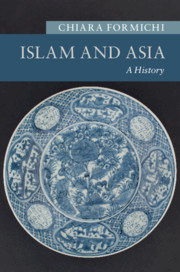Book contents
- Islam and Asia
- New Approaches to Asian History
- Islam and Asia
- Copyright page
- Dedication
- Contents
- Figures
- Maps
- Boxes
- Sources
- Preface
- Acknowledgments
- Note on Transliteration and Foreign Terms
- Maps
- Introduction
- 1 Islam across the Oxus (Seventh to Seventeenth Centuries)
- 2 Becoming Muslim (Seventh to Eighteenth Centuries)
- 3 Networks and Renewal (Thirteenth to Nineteenth Centuries)
- 4 Pan-Islamism and Nationalism (Nineteenth and Twentieth Centuries)
- 5 Muslims in the Nation-State (1940s to 1960s)
- 6 New Imaginations of Piety (1960s to 1990s)
- 7 Islam as Resistance
- 8 De-centering Islamic Authority
- 9 Studying Asia and Islam
- Glossary
- Notes
- Index
- New Approaches to Asian History
9 - Studying Asia and Islam
Published online by Cambridge University Press: 16 April 2020
- Islam and Asia
- New Approaches to Asian History
- Islam and Asia
- Copyright page
- Dedication
- Contents
- Figures
- Maps
- Boxes
- Sources
- Preface
- Acknowledgments
- Note on Transliteration and Foreign Terms
- Maps
- Introduction
- 1 Islam across the Oxus (Seventh to Seventeenth Centuries)
- 2 Becoming Muslim (Seventh to Eighteenth Centuries)
- 3 Networks and Renewal (Thirteenth to Nineteenth Centuries)
- 4 Pan-Islamism and Nationalism (Nineteenth and Twentieth Centuries)
- 5 Muslims in the Nation-State (1940s to 1960s)
- 6 New Imaginations of Piety (1960s to 1990s)
- 7 Islam as Resistance
- 8 De-centering Islamic Authority
- 9 Studying Asia and Islam
- Glossary
- Notes
- Index
- New Approaches to Asian History
Summary
In 2011 the Metropolitan Museum opened its renovated Islamic Art wing. In 2012 the Louvre opened its own new galleries on Islamic Art. Yet, neither New York nor Paris give any space to Asia beyond Moghul India. The Met’s Southeast Asia collection focuses on the Hindu-Buddhist “classical” period, while the Louvre simply does not have any objects from Asia, as these are exhibited at the Musée Guimet. This chapter suggests that the approach to the study of Islam in Asia in the nineteenth and twentieth centuries shaped an understanding of Islam as “foreign” to the region and vice versa, contributing to the idea of peculiar forms of Islamic devotion and beliefs in the lands beyond the Oxus/Amu Darya river. Illustrating the missed encounter between “Islam” and “Asia”, the chapter focuses on – and ultimately suggests ways to reconcile – the isolation of Islamic Studies and Asian Studies as two disciplinary fields of study.
Keywords
- Type
- Chapter
- Information
- Islam and AsiaA History, pp. 264 - 271Publisher: Cambridge University PressPrint publication year: 2020

